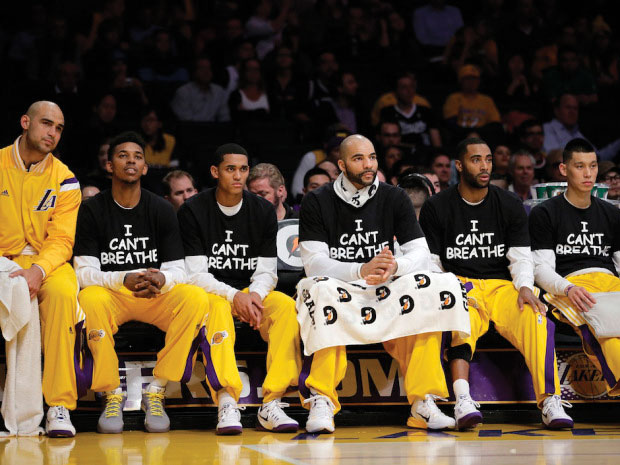It was only five years of NBA irrelevance but it felt like a lot longer for the Toronto Raptors and their fans. They had last made the playoffs in 2008, an unmemorable, uninspiring five-game loss to Dwight Howard’s Orlando Magic, and had since toggled between intentional putridity and unintentional sub-mediocrity. Their surprise run to an Atlantic Division title and a first-round series against Brooklyn should have been the complete focus.
Yet, at lower Manhattan’s Baruch College in between the third and fourth games of the series, half of the questions, at best, were about basketball: What ailed Terrence Ross? How were the Raptors going to stop Brooklyn’s Joe Johnson? Could Toronto win a road game?
The rest were reserved for the biggest off-court controversy the league had faced since referee Tim Donaghy went to jail. TMZ had just released the Donald Sterling tapes, and reporters wanted to know how the team’s veterans — Chuck Hayes, John Salmons and ex-Clipper Steve Novak — felt about the situation. All of them condemned Sterling’s hateful words, of course, but there was still some skepticism that anything would change.
“I think we all know pretty much what needs to be said,” Novak said. “I think [NBA commissioner] Adam Silver and the players association, together, they’ll get a pulse from the guys and see what needs to be said. But you guys are talking about whether there will be punishment, will they make him sell the team — I don’t think [that will happen].”
You could not blame him for feeling that way. The owners sit at the head of the table in the NBA and big money usually wins out.
To its benefit and detriment, the NBA has always been about the power of the individual. Superstars affect winning disproportionately to other leagues, and those superstars often have outsized, or at least distinct, personalities. Fans chose between Russell and Wilt, Magic and Bird, Shaq and Duncan, or Kobe and LeBron.
That changed in 2014, which was the year of the players as a collective. That stretches far beyond the San Antonio Spurs, who essentially perfected basketball through an egalitarian, selfless style, winning the NBA title back in June. It manifested itself during the first round of the playoffs, with the leak of recording of now-former Clippers owner Sterling disparaging African-Americans in a conversation with his girlfriend, V. Stiviano.
“I think it started before the Sterling case,” Hayes said earlier this month about the players’ unity. “I think it started during the lockout [in 2011]. We were forced to come together and come up with a solution that benefits both parties. I want to say that since the lockout, the guys have really treated this league as a fraternity.”
The players had spoken out on social issues before. Memorably, the Miami Heat, led by LeBron James and Dwyane Wade, all donned hoodies in a 2012 Instagram photo to bring attention to the shooting death of Florida teenager Trayvon Martin.
The Sterling issue was different, though. There was talk of the Clippers and Warriors walking out on Game 5 of their playoff series if Silver’s punishment of Sterling was not harsh enough. Before Game 4, the Clippers removed their warm-up jerseys at halfcourt and turned their warm-up shirts inside out, league sponsors and team name be damned. Similar shows of support emerged from throughout the league: James’ Heat mimicked the Clippers’ protest before a game in Charlotte, while the Raptors wore black socks instead of the traditional white ones at home in Toronto.
“More than anything, I don’t think the league can sit back and say it didn’t happen if it did,” Novak said of the Sterling crisis the day after the story broke. “There’s no way it should be tolerated. I don’t think there’s any workplace in the world you can speak that way about somebody, and I think in our league especially.”
“It’s a waiting game right now,” James said then. “We believe in the NBA. We believe in Adam Silver. Justice should be served.”
A few days later, the NBA banned Sterling for life and started the process that ended with former Microsoft CEO Steve Ballmer buying the Clippers for US$2-billion. While other factors were at play, the players had used their collective power to effect change.
So far this season, the players have continued to express themselves on issues beyond the game. Bulls star Derrick Rose wore a shirt reading “I can’t breathe” early in December, a short-form protest of the grand juries that failed to indict police officers in the deaths of Eric Garner in New York and Michael Brown in Ferguson, Mo. (A video caught Garner saying “I can’t breathe” in the midst of being choked during an arrest by an officer). Days later, Nets guard Jarrett Jack made sure James, Kyrie Irving and his own Hall of Fame-bound teammate, Kevin Garnett, wore the shirts in a game in Brooklyn attended by British royals William and Kate and Jay-Z and Beyoncé. U.S. President Barack Obama praised the players. Silver issued a statement that said he would prefer that players stick to sanctioned league apparel, but that was certainly a symbolic message to the league’s sponsors rather than a threat of actual punishment.
“I think that’s a great thing about our league, that we’re growing in that aspect of being able to step out in terms of individuality and be confident in it and stand up in when you believe it,” Jack said when his team came through Toronto in mid-December. “If there’s something in your heart, you don’t hold it in. You try to take a stance.”




